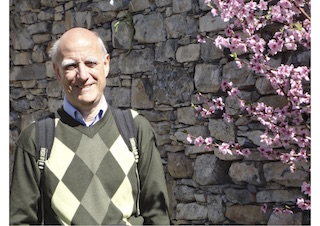Studying at the University of Verona
Here you can find information on the organisational aspects of the Programme, lecture timetables, learning activities and useful contact details for your time at the University, from enrolment to graduation.
Academic calendar
The academic calendar shows the deadlines and scheduled events that are relevant to students, teaching and technical-administrative staff of the University. Public holidays and University closures are also indicated. The academic year normally begins on 1 October each year and ends on 30 September of the following year.
Course calendar
The Academic Calendar sets out the degree programme lecture and exam timetables, as well as the relevant university closure dates..
| Period | From | To |
|---|---|---|
| Sem. IA (31.10.16 sosp.lezioni) | Oct 3, 2016 | Nov 12, 2016 |
| Sem. IB | Nov 14, 2016 | Jan 21, 2017 |
| Sem. IIA | Feb 27, 2017 | Apr 22, 2017 |
| Sem. IIB | Apr 24, 2017 | Jun 10, 2017 |
| Session | From | To |
|---|---|---|
| Sessione Estiva | Jun 12, 2017 | Jul 29, 2017 |
| Sessione Autunnale | Aug 21, 2017 | Sep 23, 2017 |
| Sessione Straordinaria | Jan 22, 2018 | Feb 24, 2018 |
| Session | From | To |
|---|---|---|
| Sessione Estiva | Jul 10, 2017 | Jul 15, 2017 |
| Sessione Autunnale | Dec 18, 2017 | Dec 21, 2017 |
| Sessione Invernale | Mar 23, 2018 | Mar 29, 2018 |
| Period | From | To |
|---|---|---|
| Festa di Ognissanti | Nov 1, 2016 | Nov 1, 2016 |
| Festa dell'Immacolata | Dec 8, 2016 | Dec 8, 2016 |
| Vacanze di Natale | Dec 23, 2016 | Jan 6, 2017 |
| Vacanze Pasquali | Apr 14, 2017 | Apr 18, 2017 |
| Festa della Liberazione | Apr 25, 2017 | Apr 25, 2017 |
| Festa dei Lavoratori | May 1, 2017 | May 1, 2017 |
| Festa del Santo Patrono - San Zeno | May 21, 2017 | May 21, 2017 |
| Festa della Repubblica | Jun 2, 2017 | Jun 2, 2017 |
| Vacanze Estive | Aug 14, 2017 | Aug 19, 2017 |
Exam calendar
Exam dates and rounds are managed by the relevant Humanistic Studies Teaching and Student Services Unit.
To view all the exam sessions available, please use the Exam dashboard on ESSE3.
If you forgot your login details or have problems logging in, please contact the relevant IT HelpDesk, or check the login details recovery web page.
Should you have any doubts or questions, please check the Enrollment FAQs
Academic staff
 alex.arcozzi@univr.it
alex.arcozzi@univr.it

Avezzu' Guido
 guido.avezzu@univr.it
guido.avezzu@univr.it
 augusto.barbi@univr.it
augusto.barbi@univr.it
 evita.calabrese@univr.it
evita.calabrese@univr.it
Carnero Roberto
 roberto.carnero@univr.it
roberto.carnero@univr.it
 alberto.cavarzere@univr.it
alberto.cavarzere@univr.it

Chiecchi Giuseppe
 giuseppe.chiecchi@univr.it
giuseppe.chiecchi@univr.it
 +39 045802 8117
+39 045802 8117
 francesco.depaola@univr.it
francesco.depaola@univr.it

Mastrocinque Attilio
 attilio.mastrocinque@univr.it
attilio.mastrocinque@univr.it
 +39 045802 8386
+39 045802 8386
 linda.napolitano@univr.it
linda.napolitano@univr.it
 gianmaria.varanini@univr.it
gianmaria.varanini@univr.it
Study Plan
The Study Plan includes all modules, teaching and learning activities that each student will need to undertake during their time at the University.
Please select your Study Plan based on your enrollment year.
1° Year
| Modules | Credits | TAF | SSD |
|---|
One course to be chosen among the following2° Year activated in the A.Y. 2017/2018
| Modules | Credits | TAF | SSD |
|---|
One course to be chosen among the following
One course to be chosen among the following
One/two courses to be chosen among the followingOne course to be chosen among the following3° Year activated in the A.Y. 2018/2019
| Modules | Credits | TAF | SSD |
|---|
Two/four courses to be chosen among the followingOne/two courses to be chosen among the following| Modules | Credits | TAF | SSD |
|---|
One course to be chosen among the following| Modules | Credits | TAF | SSD |
|---|
One course to be chosen among the following
One course to be chosen among the following
One/two courses to be chosen among the followingOne course to be chosen among the following| Modules | Credits | TAF | SSD |
|---|
Two/four courses to be chosen among the followingOne/two courses to be chosen among the following| Modules | Credits | TAF | SSD |
|---|
Legend | Type of training activity (TTA)
TAF (Type of Educational Activity) All courses and activities are classified into different types of educational activities, indicated by a letter.
History of Ancient Philosophy (p) (2017/2018)
Teaching code
4S01229
Teacher
Coordinator
Credits
6
Language
Italian
Scientific Disciplinary Sector (SSD)
M-FIL/07 - HISTORY OF ANCIENT PHILOSOPHY
Period
Sem. IIA dal Feb 26, 2018 al Apr 21, 2018.
Learning outcomes
Formative tasks:
We aim at:
-(knowledge and understanding) offering advanced knowledge on basic subjects, authors and schools within the ancient philosophy;
(communication skills) teaching the proper philosophical terminology and the arguing ability (possibly also in written communication);
-(applying knowledge and understanding) teaching the critical use of original philosophical texts, for acquiring basic philosophical matters and concepts, recalled also by contemporary culture.
Program
Course's content:
Title: “Excellence and desire: virtues and passions in Plato and Aristotle”
The contemporary culture is very interested in going beyond the traditional opposition between reason and passion: within the anthropological, moral and social fields, the role is deepened of the affective states (emotions and feelings) and the personal and social importance is stressed of an education aiming at becoming conscious and careful of own and others’ desires.
A close reading of Plato’s Dialogues and of the Aristotelian Nicomachean Ethics (books I-III) shows that we cannot find in the ancient thought any sharp opposition between reasoning and feeling: on the contrary the most important theories about virtue (aretè=excellence) required also a daily consciousness-care of own affective states.
“Decision is either understanding combined with desire or desire combined with thought; and what originates movement in this way is a human being ” (Nicomachean Ethics, 1139b4-6).
Books to be studied
a) General Part:
-for students having never studied it: E. BERTI - F. VOLPI, Storia della filosofia: dall'antichità ad oggi, Edizione compatta, 2 voll. indivisibili, Roma-Bari 2007 (vol. I : from the origins to Neoplatonism);
-for students knowing already something about this subject: P. HADOT, Che cos’è la filosofia antica?, tr. it. Torino Einaudi 1998 (ed. or. Paris 1995);
b) Lecture Notes (at students' disposal in the photocopies shop “ “Ateneo);
c) Original and Critical texts:
-ARISTOTELE, Etica Nicomachea, tr. it. di C. Mazzarelli, Milano Bompiani Testi a fronte 2000;
-‘Prospettive del gioire e del soffrire nell’etica di Platone, Milano Udine Mimesis 2013;
-Virtù, piacere e felicità nell’etica dei Greci, Verona aemme edizioni 2014 (Copisteria “Ateneo”)
All the lessons will be available by e-learning (www.elearning.univr.it);
d) Integrations and substitutions: students who cannot attend lessons, those repeating this course will get in touch with the Teacher, in order to receive indications on adding or other texts: these will be agreed for every student, with regard to his previous knowledge, curriculum and interests. Recorded lessons are compulsory for not attending students.
Teaching Methods: The course will be carried on by frontal lessons, with an introductory presentation of subjects, with direct reading of the texts on the monographical subject and following discussions. Therefore attendance at classes will be very useful and desirable, though obviously not compulsory.
PhD Student F. Benoni (francesco.benoni@univr.it) will be Teaching Assistant for this course. His duties will include lecturing and office hours. He will hold a seminar on Academic Writing and assist students during the preparation of their papers for the final exam.
| Author | Title | Publishing house | Year | ISBN | Notes |
|---|---|---|---|---|---|
| Bruno Centrone | Prima lezione di filosofia antica (Edizione 1) | Laterza | 2015 | ||
| Enrico Berti - Franco Volpi | Storia della filosofia: dall'antichità ad oggi (Edizione 1) | Laterza | 2007 | ||
| Linda Napolitano | Virtù, piacere e felicità nell'etica dei Greci (Edizione 1) | Aemme Edizioni Verona | 2014 |
Examination Methods
Prerequisites: A knowledge of the history of the ancient philosophy (from VIth Century B.C. to 529 A.D.) is previously required (if lacking, it must be acquired or improved). On the contrary a knowledge of the ancient Greek and Latin languages is not required (all the ancient original terms will be translated), although it allows to work easier within this scientific field. An attention to lexical research and an interest in a critical reading of philosophical texts are very useful.
Assesments: During the exam we aim to test the acquired knowledge of these notions.
Some oral questions will be put to the student; he will be invited to read and comment some passages of the original texts already read together during classes.
Also the possible papers written by the student and sent to the teacher a week before the exam, will be discussed together and evaluated.
Type D and Type F activities
Modules not yet included
Career prospects
Module/Programme news
News for students
There you will find information, resources and services useful during your time at the University (Student’s exam record, your study plan on ESSE3, Distance Learning courses, university email account, office forms, administrative procedures, etc.). You can log into MyUnivr with your GIA login details: only in this way will you be able to receive notification of all the notices from your teachers and your secretariat via email and soon also via the Univr app.
Student mentoring
Linguistic training CLA
Gestione carriere
Practical information for students
Documents
| Title | Info File |
|---|---|
|
|
pdf, it, 325 KB, 02/05/23 |
|
|
pdf, it, 212 KB, 02/05/23 |
|
|
pdf, it, 131 KB, 02/05/23 |
Graduation
Documents
| Title | Info File |
|---|---|
|
|
pdf, it, 99 KB, 13/10/23 |
|
|
pdf, it, 101 KB, 10/04/24 |



































